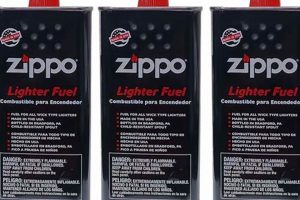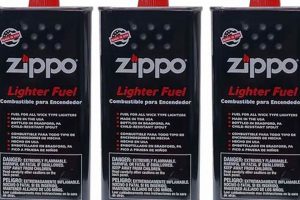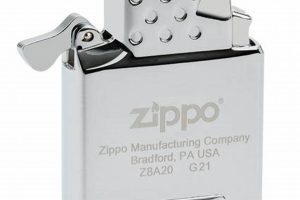Using standard butane fuel, like that found in Zippo lighters, for butane hash oil (BHO) extraction poses significant safety risks and yields a subpar product. Zippo butane often contains impurities and additives not present in refined butane specifically designed for extraction. These impurities can contaminate the final product, affecting flavor, purity, and potentially posing health hazards. Specialized extraction butane undergoes rigorous refinement processes to eliminate these unwanted substances, resulting in a cleaner and safer solvent for BHO production.
The purity of the solvent is paramount in BHO extraction. Utilizing a contaminated solvent introduces unwanted elements into the concentrate, undermining the desired purity and potentially creating health risks. Furthermore, the specific formulation of refined butane is optimized for efficient extraction and complete evaporation, leaving minimal residual solvent in the final product. The long-term health consequences of consuming BHO extracted with impure butane are not fully understood, adding further weight to the importance of using the correct solvent. Historically, as BHO extraction gained popularity, awareness of the critical distinction between standard and refined butane emerged as a crucial factor in ensuring safety and quality.
This distinction between appropriate and inappropriate solvents for BHO extraction underscores the need for careful consideration of all materials used in the process. The following sections delve deeper into safe extraction practices, recommended equipment, and the importance of solvent purity in producing high-quality, safe-to-consume BHO.
Safe Butane Hash Oil Extraction Tips
Extracting BHO requires meticulous attention to safety and proper procedures. The following tips emphasize crucial aspects of safe and effective extraction, highlighting the importance of using appropriate materials and techniques.
Tip 1: Utilize Only Refined Butane: Employ butane specifically refined for extraction. Avoid using butane intended for other purposes, such as those found in lighter refills. Refined butane undergoes rigorous purification processes, eliminating impurities that can contaminate the final product.
Tip 2: Conduct Extraction Outdoors or in a Well-Ventilated Area: Butane is highly flammable. Performing extractions in a confined space increases the risk of explosions. Open-air environments or areas with robust ventilation systems minimize this risk.
Tip 3: Wear Protective Gear: Employ appropriate safety equipment, including gloves, eye protection, and a respirator. These measures protect against potential exposure to solvents and other hazardous materials.
Tip 4: Use High-Quality Extraction Equipment: Invest in purpose-built extraction tubes designed to withstand the pressures involved. Avoid improvised or DIY apparatus, which can increase the risk of equipment failure and accidents.
Tip 5: Properly Purge the Butane: Ensure complete removal of residual butane from the final product. Incomplete purging can leave harmful solvents in the concentrate, posing health risks.
Tip 6: Understand Local Regulations: Familiarize oneself with local laws and regulations concerning BHO extraction. Adherence to legal guidelines is essential for safe and responsible practice.
Adhering to these safety precautions significantly minimizes risks associated with BHO extraction. Utilizing the proper equipment and materials ensures a higher quality product and safeguards against potential hazards.
By understanding and implementing these recommendations, individuals can move towards safer and more effective BHO extraction practices. The final section provides concluding remarks on responsible extraction and resource recommendations for further information.
1. Safety Risks
Attempting butane hash oil (BHO) extraction using unsuitable butane, such as that found in Zippo lighters, presents significant safety hazards. These risks stem primarily from the inherent flammability of butane and the potential for impurities in non-refined butane to exacerbate these dangers. Understanding these risks is crucial for anyone considering BHO extraction.
- Fire and Explosion:
Butane is highly flammable and can easily ignite in the presence of a spark or open flame. Using Zippo butane, which is not purified for extraction, increases this risk due to the presence of volatile additives. An uncontrolled release of butane gas during extraction can lead to devastating explosions, causing serious injury or property damage. Real-world examples include instances of home explosions linked to amateur BHO extraction using improper solvents.
- Chemical Burns and Inhalation:
Direct contact with butane, whether liquid or gaseous, can cause severe chemical burns to the skin and eyes. Furthermore, inhaling butane fumes can lead to respiratory irritation, dizziness, nausea, and even loss of consciousness. The impurities present in Zippo butane may exacerbate these effects, posing further health risks.
- Contamination and Health Risks from Impurities:
Zippo butane contains additives and impurities not found in refined butane intended for extraction. These impurities can contaminate the final BHO product, posing unknown health risks upon consumption. Using purified butane minimizes this risk, ensuring a cleaner and potentially safer final product.
- Equipment Failure Due to Improper Solvent:
Using an improper solvent like Zippo butane can damage extraction equipment. The additives and impurities can clog or corrode delicate components, leading to malfunctions or failures that could further increase safety risks during the extraction process.
These safety risks underscore the critical importance of using only refined butane specifically designed for extraction. Attempting BHO extraction with Zippo butane or other inappropriate solvents significantly increases the likelihood of accidents and jeopardizes the purity and safety of the final product. Prioritizing safety through the use of proper materials and techniques is paramount for responsible BHO extraction.
2. Product Contamination
Product contamination poses a significant concern when considering the use of Zippo butane for butane hash oil (BHO) extraction. Unlike refined butane specifically designed for this purpose, Zippo butane contains impurities and additives that can compromise the final product’s quality and safety. Understanding the various facets of this contamination is crucial for responsible extraction practices.
- Heavy Metals:
Standard butane, like that found in Zippo lighters, may contain heavy metals such as lead, mercury, or cadmium. These metals can persist through the extraction process, contaminating the final BHO product. Consumption of heavy metal-contaminated BHO poses serious health risks, including neurological damage and organ dysfunction. Documented cases of heavy metal poisoning linked to contaminated cannabis concentrates highlight this critical concern.
- Unrefined Additives and Mystery Oils:
Zippo butane often includes additives designed to enhance lighter performance, such as odorants or lubricants. These substances are not meant for human consumption and can introduce unknown health risks when present in BHO. The lack of transparency regarding the precise composition of these additives makes it difficult to assess their potential impact on health, increasing the importance of using pure, refined butane.
- Residual Solvents and Incomplete Purging:
The presence of impurities in Zippo butane can complicate the purging process, increasing the likelihood of residual butane remaining in the final product. Inhaling or ingesting residual butane can lead to respiratory problems and other health issues. Using refined butane facilitates a cleaner, more efficient purging process, minimizing the risk of residual solvents.
- Impact on Flavor and Aroma:
Impurities and additives in non-refined butane can significantly alter the flavor and aroma profile of the extracted BHO. This contamination can result in an unpleasant taste and diminish the desired terpene profile of the cannabis concentrate, undermining the overall quality and enjoyment of the final product.
These various forms of contamination underscore the importance of using only refined butane in BHO extraction. Choosing Zippo butane or other non-refined butane products significantly increases the risk of a contaminated final product, potentially posing serious health risks and negatively impacting the quality of the BHO. Responsible extraction practices necessitate careful consideration of solvent purity to ensure a safe and enjoyable final product.
3. Impurities and Additives
The suitability of butane for butane hash oil (BHO) extraction hinges critically on its purity. Zippo butane, formulated for lighters, contains impurities and additives that render it unsuitable for BHO production. These substances pose significant risks to both the extraction process and the final product’s quality and safety. Understanding the nature of these impurities and additives is essential for informed decision-making regarding BHO extraction solvents.
- Heavy Metals:
Zippo butane may contain traces of heavy metals like lead, mercury, or cadmium. These metals, introduced during the manufacturing process or as byproducts of the butane source, can persist throughout extraction, contaminating the final BHO product. Consumption of heavy metal-contaminated concentrates poses serious health risks, including neurological damage and organ dysfunction. Instances of heavy metal poisoning have been linked to contaminated cannabis concentrates, emphasizing the gravity of this concern.
- Mystery Oils and Lubricants:
To enhance lighter performance, Zippo butane often includes undisclosed additives, such as mystery oils and lubricants. These substances, while suitable for combustion in lighters, are not intended for human consumption and pose unknown health risks when present in extracted BHO. Their presence can significantly alter the flavor, aroma, and potentially the safety profile of the final product.
- Odorants and Aromatic Compounds:
Some butane formulations include odorants to aid in leak detection. These added aromatic compounds can contaminate the BHO, affecting its flavor and aroma profile. While some odorants might be relatively benign, their presence introduces an uncontrolled variable into the extraction process, potentially masking the natural terpene profile of the cannabis and impacting the final product’s quality.
- Rust Inhibitors and Other Stabilizers:
To prevent corrosion within lighter mechanisms, rust inhibitors and other stabilizers are often added to butane fuels. These additives, unsuitable for human consumption, can persist through the extraction process, contaminating the BHO. Their long-term health effects when ingested or inhaled remain largely unknown, adding further concern to the use of unrefined butane for extraction.
The presence of these impurities and additives in Zippo butane underscores its unsuitability for BHO extraction. Using refined butane, specifically purified for extraction purposes, eliminates these risks and ensures a cleaner, safer, and higher-quality final product. Choosing the correct solvent is paramount for responsible and safe BHO production, protecting both the consumer and the integrity of the extraction process.
4. Refined Butane Necessary
The question “can you use Zippo butane for BHO?” underscores a critical aspect of safe and effective butane hash oil (BHO) extraction: the necessity of refined butane. Using standard butane, like that found in Zippo lighters, introduces significant risks due to the presence of impurities and additives. Understanding why refined butane is essential requires exploring its role in ensuring both product safety and quality.
- Purity and Safety:
Refined butane undergoes rigorous purification processes to remove impurities and additives that can contaminate the final BHO product. These contaminants, often present in standard butane, can pose significant health risks when consumed. Choosing refined butane prioritizes consumer safety by minimizing the risk of exposure to potentially harmful substances. Real-world examples of health complications arising from contaminated concentrates underscore the critical nature of solvent purity.
- Efficient Extraction and Purging:
Refined butane’s specific formulation facilitates efficient extraction of cannabinoids and terpenes from cannabis plant material. Furthermore, its purity aids in the purging process, ensuring thorough removal of residual solvent from the final product. This contributes to a cleaner, safer, and more potent BHO concentrate. Conversely, using impure butane can hinder both extraction and purging, potentially leaving harmful residues in the final product.
- Preservation of Flavor and Aroma:
Impurities in standard butane can negatively impact the flavor and aroma of the extracted BHO. These contaminants can introduce off-flavors or mask the delicate terpene profiles of the cannabis strain. Refined butane, by virtue of its purity, preserves the integrity of the plant’s natural flavors and aromas, resulting in a higher quality and more enjoyable final product.
- Equipment Compatibility and Longevity:
Using refined butane helps maintain the integrity of extraction equipment. Impurities in standard butane can clog or corrode delicate components, leading to equipment malfunction or premature failure. Choosing refined butane safeguards the investment in extraction equipment and ensures optimal performance over time.
The necessity of refined butane in BHO extraction directly addresses the dangers and inefficiencies associated with using standard butane like Zippo fuel. Prioritizing refined butane ensures a safer, cleaner, and higher-quality final product, mitigating potential health risks and preserving the desired characteristics of the extracted cannabis concentrates. The choice between refined butane and standard butane is not simply a matter of preference; it is a fundamental consideration for responsible and safe BHO extraction.
5. Health Hazards
Utilizing standard butane, such as Zippo fuel, in butane hash oil (BHO) extraction presents significant health hazards. This stems from the inherent impurities and additives found in such butane, not intended for ingestion or inhalation. These contaminants can remain in the final product, posing risks to consumers. The potential health consequences range from short-term respiratory irritation to long-term systemic issues, depending on the specific contaminants and the level of exposure.
One primary concern relates to heavy metal contamination. Standard butane can contain heavy metals like lead, mercury, and cadmium. These metals can persist through the extraction process, contaminating the final BHO. Heavy metal accumulation in the body can lead to severe neurological problems, kidney damage, and other chronic health conditions. Documented cases of heavy metal poisoning linked to contaminated cannabis extracts underscore the gravity of this risk. Furthermore, additives like mystery oils and lubricants, commonly found in standard butane, introduce unknown health risks as they are not meant for human consumption. Their chemical composition and potential effects on the body when inhaled or ingested remain largely unstudied, increasing the potential for unforeseen health complications. The lack of regulatory oversight regarding these additives compounds this concern. Residual solvents, including unpurged butane and its impurities, can also pose health hazards. Incomplete purging, often exacerbated by the use of impure butane, leaves residual solvents in the final BHO, which can irritate the respiratory system and potentially contribute to long-term health problems.
Understanding the health risks associated with using impure butane in BHO extraction is crucial for consumer safety. Opting for refined butane, specifically purified for extraction, significantly mitigates these risks. The choice of solvent directly impacts the safety and quality of the final product, highlighting the importance of informed decision-making in BHO production. Continued research into the long-term health effects of consuming BHO extracted with impure butane is needed to fully understand the scope of potential health hazards. This knowledge empowers consumers to make responsible choices and promotes safer practices within the cannabis extraction community.
6. Suboptimal Extraction
Suboptimal extraction is a direct consequence of using unsuitable butane, such as Zippo fuel, in butane hash oil (BHO) production. The impurities and additives present in standard butane interfere with the extraction process, hindering the efficient dissolving and collection of desirable cannabinoids and terpenes. This results in a lower yield of the target compounds and a final product with diminished potency and potentially altered characteristics. Standard butane’s inconsistent composition can also lead to unpredictable extraction outcomes, making it difficult to achieve consistent results. For instance, using butane with varying levels of impurities can produce BHO with inconsistent textures and potencies, even when using the same starting cannabis material.
The inefficiency of using standard butane for extraction stems from its intended purpose fueling lighters, not dissolving delicate cannabis compounds. The additives present, such as lubricants and odorants, can compete with the desired cannabinoids and terpenes for solubility, reducing the overall extraction efficiency. These additives can also bind to the target compounds, altering their chemical structure and potentially affecting their therapeutic properties. Consider a scenario where a specific terpene profile is desired for its therapeutic benefits. Using impure butane might degrade or alter these terpenes, diminishing the medicinal value of the final BHO product. Furthermore, incomplete extraction due to unsuitable butane leaves valuable cannabinoids and terpenes trapped within the plant material, representing a loss of both potency and potential therapeutic benefits.
Understanding the link between suboptimal extraction and the use of inappropriate butane is crucial for producing high-quality BHO. Utilizing refined butane, specifically formulated for extraction, ensures efficient dissolving and collection of target compounds, maximizing yield and preserving the desired characteristics of the cannabis strain. This translates to a more potent, flavorful, and potentially safer final product. Recognizing the limitations and potential drawbacks of using standard butane highlights the importance of investing in the appropriate materials and prioritizing quality over cost-cutting measures in BHO production.
Frequently Asked Questions
This FAQ section addresses common inquiries regarding butane hash oil (BHO) extraction and the crucial role of butane purity. Clarity on these points promotes safe and effective extraction practices.
Question 1: Why is using refined butane so important for BHO extraction?
Refined butane undergoes rigorous purification processes, removing impurities and additives that can contaminate the final BHO product and pose health risks. Standard butane, like that used in Zippo lighters, contains these contaminants, making it unsuitable for extraction.
Question 2: What are the specific risks of using impure butane for BHO extraction?
Risks include heavy metal contamination, introduction of unknown additives, difficulty purging residual solvents, and altered flavor profiles. These factors can compromise the quality, safety, and overall experience of the final product.
Question 3: Can impurities in butane affect the efficiency of the extraction process?
Yes, impurities can hinder the dissolving and collection of desirable cannabinoids and terpenes, resulting in a lower yield and a less potent final product. They can also complicate the purging process, potentially leaving harmful residues in the BHO.
Question 4: Are there legal implications associated with using impure butane for BHO extraction?
Producing contaminated BHO could have legal ramifications depending on local regulations concerning cannabis concentrates and extraction practices. Prioritizing purity ensures compliance with safety and quality standards.
Question 5: Where can one obtain refined butane suitable for BHO extraction?
Refined butane specifically designed for extraction is available from specialized retailers catering to the cannabis extraction community. These suppliers prioritize purity and provide products suitable for safe and effective BHO production.
Question 6: How can one ensure complete purging of butane after extraction?
Proper purging techniques, including vacuum purging and low-heat evaporation, are crucial for removing residual butane. Using refined butane facilitates this process significantly due to its higher purity and lower boiling point. Monitoring the purging process closely ensures complete removal of the solvent.
Solvent purity is paramount in BHO extraction. Selecting refined butane safeguards consumer health, optimizes extraction efficiency, and ensures a higher quality final product. Prioritizing safety and quality through informed material selection is essential for responsible extraction practices.
The following resources provide additional information on safe extraction techniques and best practices within the cannabis extraction community.
Conclusion
Exploration of the question “can you use Zippo butane for BHO?” reveals the critical importance of solvent purity in butane hash oil (BHO) production. Using standard butane, like Zippo fuel, introduces significant risks due to the presence of impurities and additives not found in refined butane specifically designed for extraction. These contaminants can compromise the safety, quality, and efficiency of the extraction process, potentially leading to a contaminated final product with diminished potency and unknown health risks. Heavy metals, mystery oils, lubricants, and other additives present in standard butane pose serious health hazards when ingested or inhaled. Furthermore, these impurities can interfere with the extraction process itself, hindering the efficient dissolving and collection of desired cannabinoids and terpenes, resulting in a suboptimal yield and an inferior final product. The use of refined butane mitigates these risks, ensuring a cleaner, safer, and more efficient extraction process. Refined butane’s purity facilitates complete purging of residual solvent, safeguards against heavy metal contamination, and preserves the desired flavor and aroma profiles of the extracted cannabis concentrates.
Safe and responsible BHO production necessitates a thorough understanding of the materials used in the extraction process. Prioritizing the use of refined butane demonstrates a commitment to consumer safety and product quality. Continued education and advocacy for safe extraction practices within the cannabis community are crucial for minimizing potential health risks and ensuring access to high-quality, contaminant-free BHO. The choice of solvent is not merely a technical detail but a fundamental aspect of responsible extraction, directly impacting the safety and well-being of consumers. Further research into the long-term health effects of consuming BHO extracted with impure butane remains essential for informing best practices and promoting responsible cannabis consumption.







